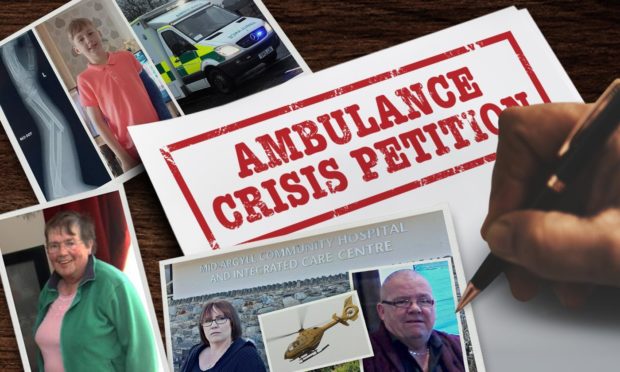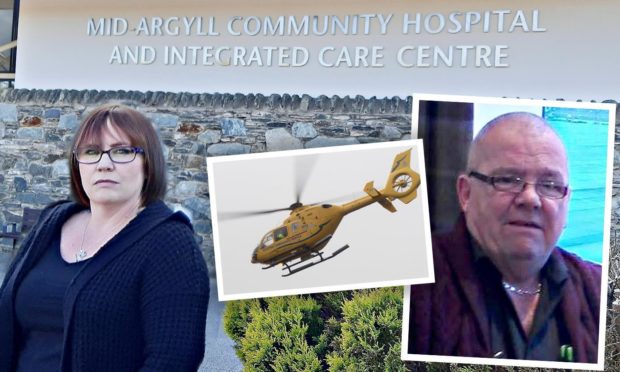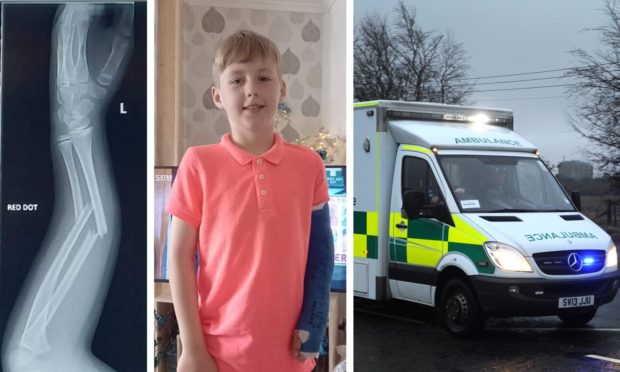Hundreds of people have supported a call to action by families hit by ambulance problems in the Argyll area.
A spate of incidents where people have been forced to rely on neighbours to take them to hospital in emergency situations has prompted their loved ones to launch an online petition.
They have been working on the campaign with Argyll and Bute’s Health and Social Care Partnership public representative, Lochgilphead-based Betty Rhodick.
Two of the families involved received apologies from the Scottish Ambulance Service last week.
But the patients and their loved ones have all been quick to say that the staff were excellent and the problem lies with the system and lack of provision.
Michael Heafey, 61, nearly died after he suffered a massive heart attack at his home in Ardrishaig.
He was clutching his chest in agony and had a history of heart problems yet a call handler told his wife Grace the pain was “probably muscular” and that no ambulance was available.
Once he did arrive at Mid Argyll Community Hospital, three miles away in Lochgilphead, courtesy of a neighbour, the staff saved his life before he was airlifted to Glasgow by air ambulance to receive a triple heart by-pass.
His daughter Karen Heafey, 40, has joined the campaign to get something done about the lack of ambulance cover.
Michael said he would be signing the petition and hoped it would help prevent someone else experiencing what he went through.
And Paula Cameron, 41, waited 35 minutes for an ambulance after her son Rhys Chamberlain, 10, collapsed on her driveway with a badly broken arm as she tried to get him into her car.
After a 35-minute wait, her neighbours stepped in and drove him to hospital after helping to lift him into their car.
He was later blue-lighted by ambulance from Mid Argyll Community Hospital to Glasgow for an operation on his arm.
Petition statement
The petition on the Change.org site, which has been signed by more than 260 people, states: “We the undersigned ask that the SAS and the Scottish Government work together to ensure that the future of the said service will be suitable for purpose for all concerned.”
It lists a series of recent incidents and asks: “How long is it going to be before someone dies because one ambulance is not available in our rural area?”
Paula said: “My complaint is not the crew or staff. They were amazing every step of the way from the Mid Argyll hospital, in the ambulance to Glasgow and all the staff at the sick children’s hospital.”
Seeking answers
She added: “My complaint is, why are there shortages? And what can be done to make more people become paramedics?”
Karen Heafey added: “We really want to ask for an explanation. What is the problem? Where is it stemming from? Is it the pandemic? Are they short of staff? What can be done to create new staff?”
Betty Rhodick, public member of the HSCP, said: “We are calling for services to be looked at.
“Whether there is a shortage of drivers, a shortage of money, should the government not be stepping in?
“Every member of the public is a patient”
“When we are talking about patients ultimately we are talking about ourselves. It could be a doctor, it could be a nurse.
“Every member of the public is a patient regardless of what position they hold or what office. They are still a patient.
“The authorities must remember when they make decisions they are talking about themselves. I think they lose sight of that when they are making policies. You never know the minute.
“Anyone could be a patient on any given day. People forget that.”
Recruiting more staff
A spokesman for the SAS said: “We are aware of the concerns raised in the petition and our highly committed staff in communities and in ambulance control centres are working tirelessly in these challenging times to respond to patients as quickly as possible.
“However, like all areas of the NHS, our service has been under significant pressure as a result of the pandemic and this has regrettably lead to delays.
“The Scottish Ambulance Service is a national service and ambulances are not restricted by geographical area.
“We will always dispatch the closest, most appropriate response to all emergency calls and have a wide range of resources which can be deployed depending on the nature of the incident and the condition of the patient.
“In the past year, we have eliminated on-call working in Oban and have the highest number of staff the area has ever had. We are currently recruiting and training additional staff and purchasing additional ambulances to help further reduce delays.”


